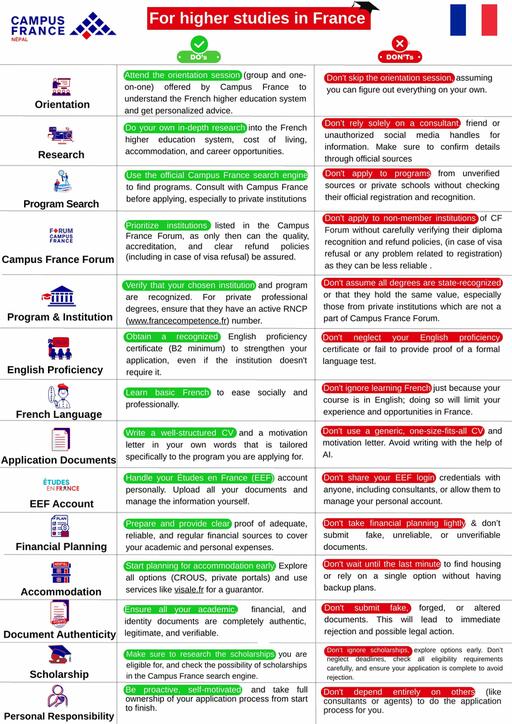Do’s and Don’ts - Study in France
Mise à jour le

Étudiants, Chercheurs
Pays concerné(s)
Nantes Métropole
If you are planning to study in France, there are many things you need to know in order to prepare properly. To guide you, Campus France Nepal has prepared a list of essential Do’s and Don’ts. Please go through them carefully to ensure a smooth academic journey in France.
Click the link to download pdf of Do's & Dont's : https://www.nepal.campusfrance.org/media/177
Read these 14 points carefully to prepare yourself in a better way.
Orientation
- Attend the orientation session (group and one-on-one) offered by Campus France to understand the French higher education system and get personalized advice.
- Don't skip the orientation session, assuming you can figure out everything on your own.
Research
- Do your own in-depth research into the French higher education system, cost of living, accommodation, and career opportunities.
- Don’t rely solely on a consultant, friend or unauthorized social media handles for information. Make sure to confirm details through official sources
Program Search
- Don't apply to programs from unverified sources or private schools without checking their official registration and recognition.
- Use the official Campus France search engine to find programs. Consult with Campus France before applying, especially to private institutions
Campus France Forum
- Prioritize institutions listed in the Campus France Forum, as only then can the quality, accreditation, and clear refund policies (including in case of visa refusal) be assured.
- Don't apply to non-member institutions of CF Forum without carefully verifying their diploma recognition and refund policies, (in case of visa refusal or any problem related to registration) as they can be less reliable .
Program & Institution
- Don't assume all degrees are state-recognized or that they hold the same value, especially those from private institutions which are not a part of Campus France Forum.
- Verify that your chosen institution and program are recognized. For private professional degrees, ensure that they have an active RNCP (www.francecompetence.fr) number.
English Proficiency
- Obtain a recognized English proficiency certificate (B2 minimum) to strengthen your application, even if the institution doesn't require it.
- Don't neglect your English proficiency certificate or fail to provide proof of a formal language test.
French Language
- Learn basic French to ease socially and professionally.
- Don't ignore learning French just because your course is in English; doing so will limit your experience and opportunities in France.
Application Documents
- Write a well-structured CV and a motivation letter in your own words that is tailored specifically to the program you are applying for.
- Don't use a generic, one-size-fits-all CV and motivation letter. Avoid writing with the help of AI.
EEF Account
- Handle your Études en France (EEF) account personally. Upload all your documents and manage the information yourself.
- Don't share your EEF login credentials with anyone, including consultants, or allow them to manage your personal account.
Financial Planning
- Prepare and provide clear proof of adequate, reliable, and regular financial sources to cover your academic and personal expenses.
- Don't take financial planning lightly & don’t submit fake, unreliable, or unverifiable documents.
Accommodation
- Start planning for accommodation early. Explore all options (CROUS, private portals) and use services like visale.fr for a guarantor.
- Don't wait until the last minute to find housing or rely on a single option without having backup plans.
Document Authenticity
- Ensure all your academic, financial, and identity documents are completely authentic, legitimate, and verifiable.
- Don't submit fake, forged, or altered documents. This will lead to immediate rejection and possible legal action.
Scholarship
- Make sure to research the scholarships you are eligible for, and check the possibility of scholarships in the Campus France search engine.
- Don’t ignore scholarships, explore options early. Don’t neglect deadlines, check all eligibility requirements carefully, and ensure your application is complete to avoid rejection.
Personal Responsibility
- Be proactive, self-motivated, and take full ownership of your application process from start to finish.
- Don't depend entirely on others (like consultants or agents) to do the application process for you.











